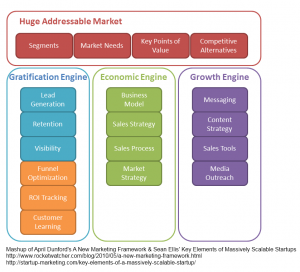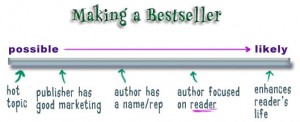I was excited to attend MeshU (maybe a little too excited). I love it when events over deliver. MeshU was a fantastic conference. I saw two of the best in-the-trenches startup sessions with Sean Ellis and Dan Martell. They both presented ideas that are changing how I think about product design and go-to-market activities. April Dunford then added an updated framework for product marketing which was a great evolution of traditional product marketing. Sean Ellis added his model for Key Elements of Massively Scaleable Startups that presented a new idea of the marketing basics that need to be present for high potential startups.

Key Elements of Massively Scalable Startups - A Marketing Framework based on April Dunford & Sean Ellis
The breaking down of 4 elements coupled with traditional strategy and tactics make for a very effective marketing evaluation of most startups.
Gratification Engine
The Gratification Engine was a new piece of the marketing activities. What differentiates must have products and services? How do you reward your customers? How does your application turn “cold prospects into highly gratified customers”? This is a change in my thinking about the role of making your users feel like rockstars.
“you can’t force customers to want, need or like what you have created. Building an effective gratification engine is an iterative process driven by a lot of prospective customer feedback. Once you get the basics right, your process of gratifying users can be optimized with tools like Performable for landing pages and KISSmetrics for full funnel tracking/improvement (I’m an advisor to both).” – Sean Ellis
It builds upon seminal work of Kathy Sierra about engaging users. The Gratification Engine pushes this out beyond the existing experience but treats the conversion and effectiveness of new users.
Where this hit home for me was starting to think about the game mechanics used for upsell and cross sell offers for new customers. Dan Martell, Dave McClure, Marc Gingras and I had breakfast at StartupCampMontreal and discussed how to build effective offers for existing customers to invite their friends to an application. There was a great discussion about using game mechanics around the offer. You have existing users that if they invite new users, i.e., their friends, where if the friends sign up that both the friend and the user get new unique functionality. It changed my thinking about many times I’ve received an offer to sign up from a friend for a service, and how the effectiveness of this would change with some basic game mechanics:
“Jevon has invited you to join X. Jevon is 1 sign up away from enabling the super awesome next level feature. Sign up now and enable the feature for both you and Jevon”
This all has to be done in an open, honest and unintrusive manner. But it’s about how do you enhance the lives and experiences of customers and potential customers. There are great opportunities to use game design and mechanics to help improve the experience and conversion rates in web and mobile applications.

